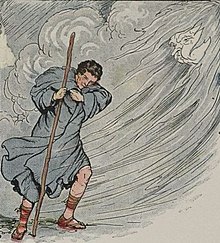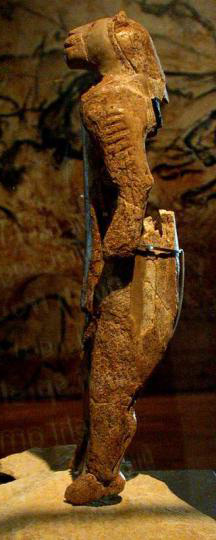Anthropomorphism
Anthropomorphism is the addition of human traits to something that is not a human. For example, the non-human might have human feelings, needs, and wants.[1] It is common for people to use anthropomorphism.[2]


Anthropomorphism is often used in stories and art. The story of the "Three Little Pigs" has a wolf and three pigs who talk and act like humans. Disney's Mickey Mouse also talks and acts like a human. An anthropomorphized animal is called a "furry".
The novel The Call of the Wild also uses anthropomorphism. The main character is a dog named Buck. Many other characters are dogs and wolves. In the story, the animals think and act more like humans than dogs.
Reasons for anthropomorphism
changeHumans can usually explain why humans do things. Humans are not as good at explaining why non-human things do things. This can lead to people assuming non-human things will do things like humans.
Humans learn about other humans early in life. They know more about humans than about things that are not humans, and they can remember it better.[3]
Related pages
change- Furry: A section of anthropomorphism where animals and legendary creatures are shown as human-like in stories and art, It's a modern name given for Anthropomorphic Animals.
References
change- ↑ Oxford English Dictionary. "Anthropomorphism, n." Oxford University Press, 1885.
- ↑ Hutson, Matthew (2012). The 7 Laws of Magical Thinking: how irrational beliefs keep us happy, healthy, and sane. New York: Hudson Street Press. pp. 165–81. ISBN 978-1-101-55832-4.
- ↑ Epley, Nicholas; Waytz, Adam; Cacioppo, John T. (2007). "On seeing human: A three-factor theory of anthropomorphism". Psychological Review. 114 (4): 864–886. CiteSeerX 10.1.1.457.4031. doi:10.1037/0033-295x.114.4.864. PMID 17907867. S2CID 6733517.